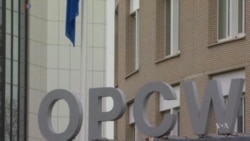WASHINGTON —
The United Nations has called on Syria to complete the surrender of its chemical weapons by the approaching deadline. The well-armed forces of President Bashar al-Assad appear to be gaining ground in the Syrian civil war, which has claimed an estimated 150,000 lives and has divided the country. The United States has promised to increase its non-lethal aid to the Syrian opposition, but a growing number of U.S. lawmakers say this is not enough to even the odds in the deadly conflict.
Sigrid Kaag, mission chief of the U.N.'s Organization for the Prohibition of Chemical Weapons, said Thursday in New York that the bulk of Syria's chemical weapons have been removed for destruction, but that 8 percent remain in the government's possession.
"In terms of chemical weapons removal for onward destruction, including destruction in country, we've reached significant progress -- 92 percent. However, there is concern, and that we have also expressed as a joint mission, that the remaining 8 percent is currently inaccessible due to the security conditions in country," said Kaag.
Kaag urged Syrian authorities to allow safe access to the remaining chemical weapons material by the June 30 deadline.
"The ships are waiting. Our Norwegian and Danish friends, they are waiting. They want to take the last batch of the chemical weapons materials. And the U.S. ship, of course, is very eager to start destruction. Because the clock is ticking," said Kaag.
In Washington, U.S. Secretary of State John Kerry met with Syrian Opposition Coalition President Ahmad al-Jarba.
“We have taken several steps this week to demonstrate our growing partnership with the coalition, and I look forward today to continuing our dialogue on a full range of our shared concerns in Syria, including putting an end to the violence, countering the regime, easing the humanitarian crisis and building towards the day when we will see a truly representative government that is responsive to the needs of the Syrian people,” said Kerry.
Jarba asked for more U.S. support in the uneven struggle between well-armed government forces and inadequately equipped opposition fighters.
"The Syrian people are looking to the superpower, the country that plays a leading role in the world, and we look forward to working with you now and in the future. Our goal is to establish a pluralistic civil society.... A state that is just, where all minorities live side-by-side with the majority," said Jarba.
The United States plans a $27 million increase in non-lethal assistance to the opposition, but says it will not provide arms or other military support. However, Jarba got a more sympathetic ear from some U.S. lawmakers. Democratic Senator Bob Casey said he has written to President Barack Obama on behalf of Syria's moderate opposition.
"I asked that the president seriously consider allowing the deployment of lethal assistance to the moderate military opposition. A serious effort to help narrow the gulf between the moderate opposition and the better trained and better equipped extremist fighters would not only boost morale in the Free Syria Army, but could actually change the momentum of the battle," said Casey.
President Assad has set June 3 for Syria's presidential elections, despite the ongoing fighting and the absence of millions of Syrians who have fled the conflict.
Sigrid Kaag, mission chief of the U.N.'s Organization for the Prohibition of Chemical Weapons, said Thursday in New York that the bulk of Syria's chemical weapons have been removed for destruction, but that 8 percent remain in the government's possession.
"In terms of chemical weapons removal for onward destruction, including destruction in country, we've reached significant progress -- 92 percent. However, there is concern, and that we have also expressed as a joint mission, that the remaining 8 percent is currently inaccessible due to the security conditions in country," said Kaag.
Kaag urged Syrian authorities to allow safe access to the remaining chemical weapons material by the June 30 deadline.
"The ships are waiting. Our Norwegian and Danish friends, they are waiting. They want to take the last batch of the chemical weapons materials. And the U.S. ship, of course, is very eager to start destruction. Because the clock is ticking," said Kaag.
In Washington, U.S. Secretary of State John Kerry met with Syrian Opposition Coalition President Ahmad al-Jarba.
“We have taken several steps this week to demonstrate our growing partnership with the coalition, and I look forward today to continuing our dialogue on a full range of our shared concerns in Syria, including putting an end to the violence, countering the regime, easing the humanitarian crisis and building towards the day when we will see a truly representative government that is responsive to the needs of the Syrian people,” said Kerry.
Jarba asked for more U.S. support in the uneven struggle between well-armed government forces and inadequately equipped opposition fighters.
"The Syrian people are looking to the superpower, the country that plays a leading role in the world, and we look forward to working with you now and in the future. Our goal is to establish a pluralistic civil society.... A state that is just, where all minorities live side-by-side with the majority," said Jarba.
The United States plans a $27 million increase in non-lethal assistance to the opposition, but says it will not provide arms or other military support. However, Jarba got a more sympathetic ear from some U.S. lawmakers. Democratic Senator Bob Casey said he has written to President Barack Obama on behalf of Syria's moderate opposition.
"I asked that the president seriously consider allowing the deployment of lethal assistance to the moderate military opposition. A serious effort to help narrow the gulf between the moderate opposition and the better trained and better equipped extremist fighters would not only boost morale in the Free Syria Army, but could actually change the momentum of the battle," said Casey.
President Assad has set June 3 for Syria's presidential elections, despite the ongoing fighting and the absence of millions of Syrians who have fled the conflict.





